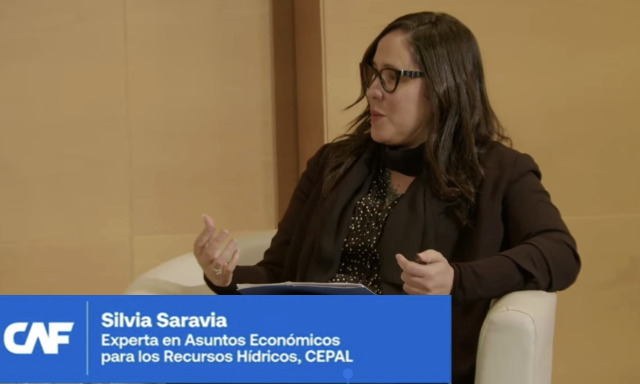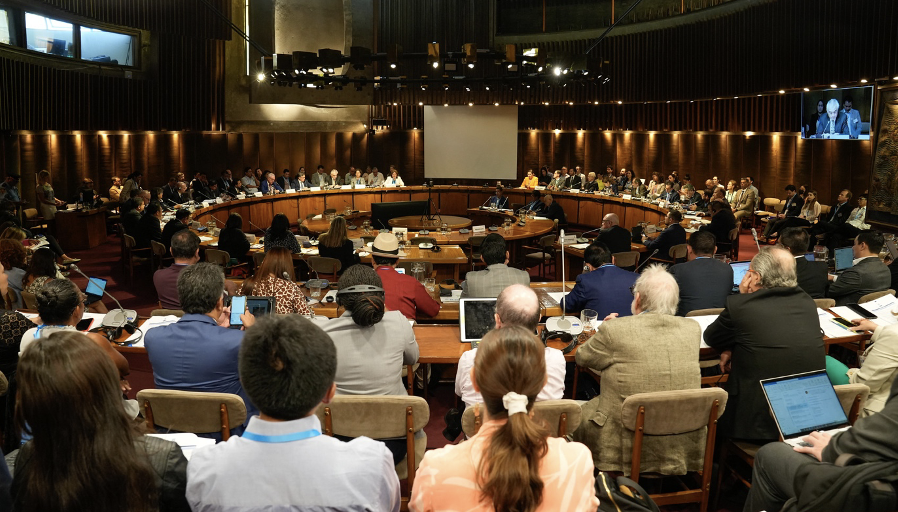ECLAC Participates in the 9th Water Dialogues of LAC - Spain, Focused on Finance for Closing Gaps in the Water Sector
Work area(s)
Topic(s)
The high-level event was organized by the Development Bank of Latin America (CAF) and took place in Madrid on November 28, 2023. In its 9th edition, the Water Dialogues of LAC - Spain, emphasized financing for key infrastructures in water security and climate resilience, highlighting the importance of achieving Sustainable Development Goal 6 and reducing gaps in the sector.

The Water Dialogues of LAC - Spain, are a thematic discussion forum organized annually with the aim of promoting the exchange of knowledge and experiences between Latin America and Spain on matters of interest for the water sector. Access the event agenda here.
In its ninth edition, the focus was on "Financing for Bridging Gaps." A CAF study analyzing thirteen countries served as the basis, indicating that an average investment of $365 billion per year until 2030 is needed to ensure necessary infrastructure for water security. This financial challenge is compounded by increased fiscal pressure due to the COVID-19 pandemic, demanding not only economic recovery but also more inclusive and climate-resilient growth. Therefore, it is crucial for countries to increase and optimize investments in water infrastructure, a key element in achieving the Sustainable Development Goals (SDGs). This involves the need to adopt innovative approaches in financing, both public and private, integrating advanced technologies and digitalization. Additionally, implementing medium and long-term strategies for efficient and prioritized allocation of resources based on inclusion and preparedness for climate change is essential. Access the event recording here.
The opening ceremony was chaired by Hugo Morán, Secretary of State for the Environment, Ministry for Ecological Transition and Demographic Challenge, Spain; Christian Asinelli, Corporate Vice President of Strategic Programming at CAF; and Gonzalo García Andrés, Secretary of State for Economy and Business Support of Spain. Following this, Ángel Cárdenas, Manager of Urban Development, Water, and Creative Economies at CAF, presented on gaps and investments in water and climate resilience in Latin America and the Caribbean (LAC) until 2030 and 2040.
The first session titled “Action Plans and Commitments for the 2030 Agenda” was started by Teodoro Estrela, Director General for Water, MITERD, Spain, with a brief session into the challenges and financing of hydrological plans (3rd cycle) for water security. This was later followed up by a high-level panel composed of Ana Carolina Argolo Nascimento de Castro, Director of ANA in Brazil; Rubén Alemán President, ANDA, El Salvador; María Fernanda Espinosa Comisionada, Global Commission on Water Economics; and moderated by Franz Rojas-Ortuste, Director of Water and Sanitation Analysis, CAF.
The second session focused on Innovative Financing for Water Security, and was moderated by Concepción Marcuello, International Water Affairs Coordinator - Support Unit, MITERD. This high-level session counted with the participation of Santia Bradshaw, Deputy Prime Minister and Minister for Transport, Works and Water Resources, Barbados; Pablo Bereciartúa, President of the Global Water Partnership, GWP; and Dr. Silvia Saravia, Officer in Economic Affairs and expert in Water Resources at ECLAC.
On behalf of ECLAC, Dr. Silvia Saravia, emphasized the lack of investment in water infrastructure in Latin America. She highlighted calculations from ECLAC related to the Gross Domestic Product (GDP) and the current context of water financing in the LAC region, with some countries needing to invest approximately 4% of their annual GDP over a sustained period to close current gaps. Such financing gaps require innovative ways to attract necessary investment. In this context, "blended finance" is a potential tool that could be used to facilitate this process. Furthermore, she highlighted the reluctance of the private sector to invest in the water sector as a deeply rooted trend in the region. The private sector perceives high risks, unfavorable interests, and excessive transaction costs, hindering collaboration between public and private funds. Additionally, she identified obstacles such as a weak payment culture and the need to reassess the value of water, which are crucial for establishing effective financial strategies in the sector. Finally, she emphasized the importance of regional commissions serving as platforms for collaboration and synergy generation. Access the interview here.
The event concluded with the closing remarks from Ignacio Corlazzoli, Manager for Europe, Asia and Middle East, CAF, highlighting the need to develop sustainable and resilient water infrastructures.
Related content

This was ECLAC's 2023 Regional Water Dialogues
On February 1, 2 and 3, the Regional Water Dialogues were held, from which the Regional Water Action Agenda was elaborated. It included all the commitments made to accelerate the achievement of SDG 6…
Country(ies)
-
Spain